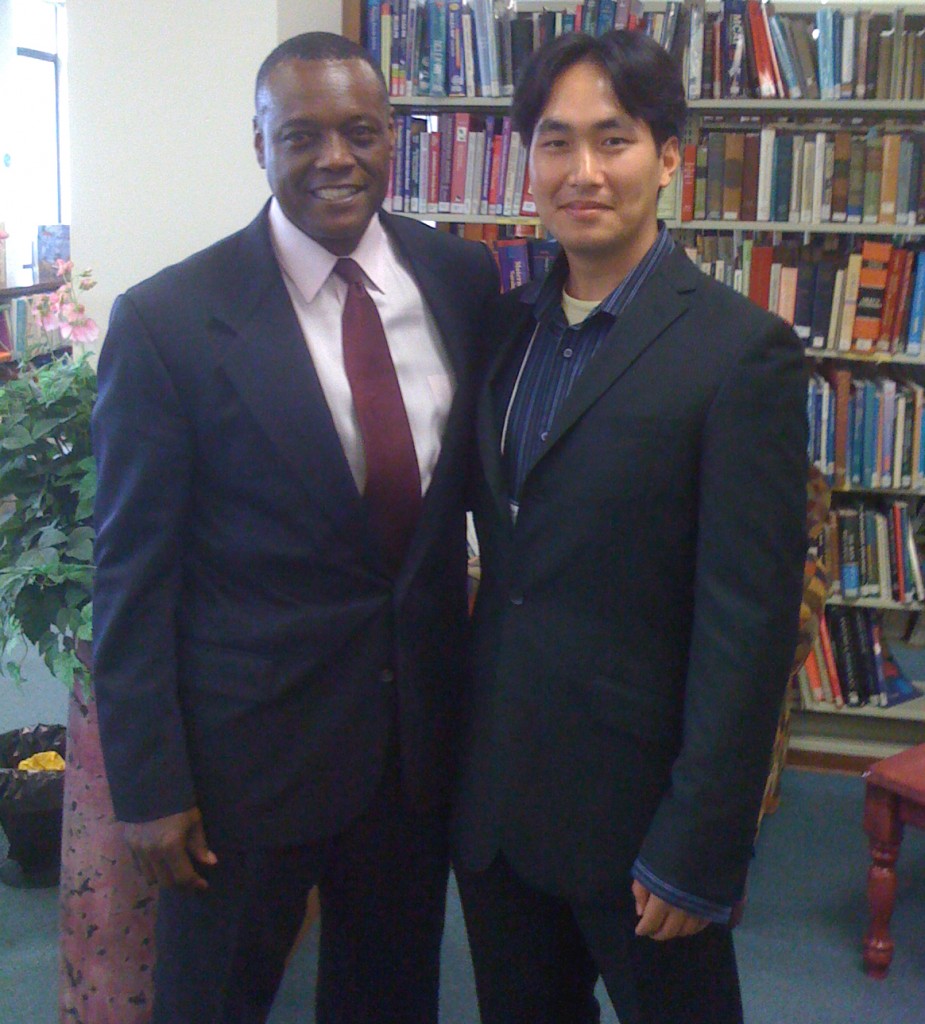Five students from California State University, Dominguez Hills were chosen from colleges and universities nationwide to spend two weeks in June at the Emerging Minority Business Leaders Summer Institute (EMBL), which took place at West Liberty University in West Virginia. Business administration students Philippa Clarke, Chinedum (Austen) Ezenwa, Todd Ireland, Jorge Morales, and Gloria Talbot participated in a the U.S. Department of Commerce-sponsored program. Activities included lectures and workshops on leadership skills, self-management, minority-owned businesses, financial planning, and accessing capital.

Todd Ireland, a recent graduate of the business administration program who earned his bachelor’s degree this spring with an emphasis on management and human resources, says that EMBL was a once-in-a-lifetime opportunity for a college student.
“There is so much research and planning to do before one opens or takes over a business,” he says. “If they do the due diligence… their business will have a higher success rate than [if they open] one up without doing their homework.”
Jorge Morales, a junior majoring in business with a concentration on entrepreneurship, was doubly excited about attending EMBL: he had never traveled outside of California before the conference. He says that the differences in pace of life and culture in West Virginia and Washington D.C., where the students did a bit of sightseeing, were inspiring.
“I went from seeing smog to breathing clear air, especially in West Virginia,” Morales recalls. “It was beautiful and green all over the place. I’m used to a fast-[paced lifestyle]. Over there, it was slow paced, living life to the fullest, listening to the birds, looking at the [fireflies]. It was more about interaction and relationships; where here it’s more about your profession and your status. I’m bringing that back here.”
Students at EMBL also had the opportunity to create and present a mock business or commercialization plan using patented technologies. Morales and his “team” created a product that would maintain the temperature of transfusable blood for up to three days using an aluminum sleeve cooled by argon. He says that the students envisioned marketing the product to the military due to the need for it in mobile medical units and the possibility of government funding.

“What I got out of that is interesting: That out of a sketch and an idea… you come up with an actual product is amazing,” says Morales.
Ireland, who works in the laser department on the Advanced Tactical Forward Looking Infrared Rangefinder project at Raytheon, says that he looks forward “150 percent” to opening his own research and development company, focusing on either aerospace or the medical field.
“I was able to get so much valuable information out of [EMBL],” says Ireland. “I would be doing myself an injustice if I just sit back and forget everything I learned.”
Ireland’s group at EMBL devised a business plan for producing titanium carbide for a number of uses. They worked with a patented method of pumping titanium carbide powder onto the focal point of a laser beam housed in a pressure chamber. Although titanium carbide is very brittle, this process would make the resulting strand flexible while retaining its strength.
“Once people can produce flexible titanium carbide in large quantities, the applications for it will be limitless,” says Ireland, who had an opportunity to speak with the inventor of the process. “For example, architects could use it in buildings, and the designs they could create would be unheard of.”
Morales, who started a green-printing company two years ago, looks forward to his next venture: a crêpe restaurant. As chef and owner, he hopes to establish the first location in Huntington Park, where he says there is currently nothing like it for miles, and eventually grow the business into a chain.
“I want to see how big I can make it,” says Morales.

Ezenwa was inspired to attend EMBL by a presentation given by Tyrone Taylor, the institute’s program manager.
“In his presentation, Mr. Taylor described how we would be working with other student from around the country to formulate a real working business plan and it was that [which] inspired me to apply to the program.
“I have always planned to start a business, but had held back due to self-doubt,” says Ezenwa, who aspires to open his own marketing firm. “Through [EMBL], I got to find out about being proactive and taking smart risks that are part of being an entrepreneur.”
Philippa Clarke, who hopes to open her own business someday, says that she was encouraged by the common drive of her fellow attendees at EMBL, who all possessed “a passion to succeed at the next level.”
“I learned that there is no timeline for success,” she says. “It can take a year, or many years to succeed in your venture.”
Morales says that the collaborative spirit at EMBL was encouraging.
“There were MBA and Ph.D. students there, they were at a different level,” he recalls. “Just because [some] had a higher education, they weren’t going to not listen to others’ opinions. We all learned from each other.”
Morales says that EMBL also underscored “the qualities that [an entrepreneur] should have if they’re thinking about venturing into business: persistence, being able to love what you do. Being able to realize there are going to be failures. Another thing to realize is to be well prepared. When I say well prepared, it changes. But you’ve got to be well prepared to realize that things are going to change.”